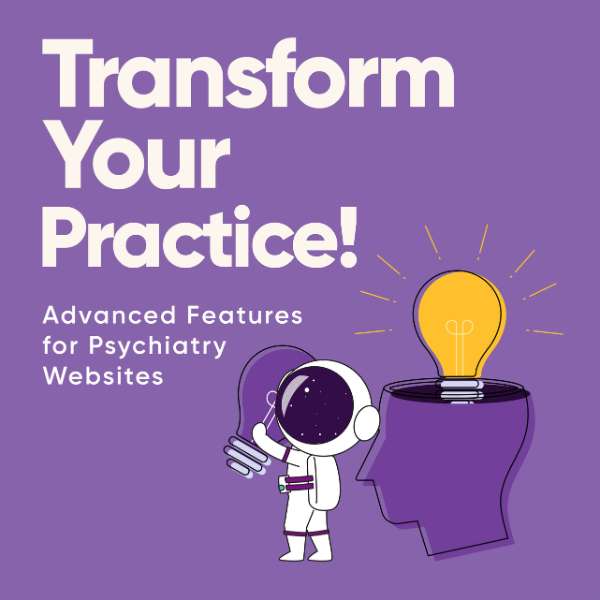Advanced Features for Psychiatry Practice Websites
Professional Design For Counseling Websites
Are you a psychiatrist wondering how your online presence could be the key to reaching more clients and making a lasting impact in the world of mental health?
As therapists and psychologists, you’re not just navigating the challenges of the mind; you’re navigating a dynamic digital landscape.
This blog will explore the advanced features of psychiatry practice website design. We’ll unravel the secrets that go beyond the surface, exploring how advanced web features can elevate your online presence and redefine the way you connect with your audience.
Let’s jump in!

The Unique Needs of Psychiatry Practice Websites
First off, think about it—psychiatry isn’t your everyday topic. It’s all about mental health, a sensitive and personal area.
So, when it comes to websites for psychiatrists, it’s not just about info; it’s about connecting on a deeper level.
Psychiatrists and therapists need more than just a visually appealing website; they need a compassionate online environment that understands and respects the nature of their work.
The Role of Creative Design
Creative design for psychiatry practice websites isn’t just about making things look great. It’s about care. It’s about creating a virtual space that says, “We’re here for you, and your mental well-being is our top priority.
Think of a website that feels like a safe haven, a virtual space that exudes calmness. Creative design elements play a pivotal role in transforming psychiatry practice websites into welcoming digital spaces that resonate with visitors.
- Immersive Experience Creation: Creative design is the driving force behind crafting an immersive online environment. It goes beyond the visual aspects, aiming to create an experience that resonates with visitors on a deeper level.
- Establishing Emotional Connections: The role of creative design extends to establishing emotional connections with the audience. By carefully selecting colors, layouts, and visual elements, the website becomes a safe and calming space, fostering a sense of trust and connection.
- Transforming Psychiatry Practice Websites: Creative design plays a pivotal role in the transformation of psychiatry practice websites. It’s not just about aesthetics; it’s about shaping the entire digital space to reflect the values and atmosphere that mental health professionals want to convey.
- Enhancing User Engagement: The role of creativity is to captivate and engage users. Through thoughtful design elements, visitors are drawn into a virtual space that encourages exploration and interaction, creating a positive and memorable experience.
- Creating a Virtual Safe Haven: Envision the website as more than just a collection of pages. The role of creative design is to shape it into a virtual safe haven—a place where visitors feel comforted, understood, and at ease. This emotional resonance is a key aspect of effective web design.
- Resonance with Target Audience: Creative design is tailored to resonate specifically with the target audience of psychiatry practice websites. By understanding the unique needs and sensitivities of individuals seeking mental health support, the design creates an environment that feels welcoming and relevant.
The role of creative design goes beyond the surface, reaching into the emotional and experiential realms, ultimately shaping the virtual space into a therapeutic and inviting digital haven.
Connecting with Clients and Visitors
Now, let’s talk about empathy. Empathy is the cornerstone of effective design. An empathetic approach ensures that your website conveys exactly what you, as a therapist, want your visitors to feel and understand.
It’s about forging a connection in the digital realm that mirrors the trust you build in your therapy room. Real-life examples abound where empathetic design has significantly improved user engagement, making the virtual experience as personal as an in-person session
Navigating Change in the Digital World
In a world where technology evolves faster than the seasons change, grit becomes a therapist’s best friend. The ability to adapt and embrace new strategies is crucial.
Challenges may arise, but a gritty approach sees them as opportunities for growth. As we navigate the ever-shifting landscape of technology, we’ll uncover how grit can turn challenges into triumphs.
Advanced Features for Psychiatry Practice Website Design
Now, let’s get into the good stuff – advanced features for psychiatry practice websites. Think of seamless appointment scheduling, secure teletherapy options, informative resources, and a user-friendly interface. These are not just features; they are tools that empower therapists and enhance the overall user experience.
By integrating these advanced features, you’re not just building a website; you’re creating a digital hub for healing. Implementing these advanced features for psychiatry website design requires a thoughtful approach. From intuitive navigation to secure patient portals, each element serves a purpose. Now, let’s explore the specifics:
Seamless Appointment Scheduling
Think of a virtual receptionist that works 24/7, allowing your clients to schedule appointments at their convenience. This feature not only streamlines the booking process but also minimizes the administrative burden on your end. A seamless scheduling system ensures that potential clients can effortlessly find the right time to connect with you, fostering accessibility and efficiency.
Secure Teletherapy Options
Beyond the convenience of scheduling, the inclusion of secure teletherapy options transforms your website into a confidential therapy space.
Integrate end-to-end encryption and HIPAA-compliant technologies to guarantee a secure and private virtual interaction.
This feature becomes especially crucial in an era where virtual connections are becoming the norm, providing your clients with a trusted platform for remote sessions.
Informative Resources Section
Dive deeper into the concept of an informative resources section by envisioning a digital library tailored for your clients. This feature goes beyond basic information, offering downloadable guides, articles, and multimedia resources. Become a go-to source for mental health insights, establishing your website as a valuable hub of knowledge.
This not only positions you as an authority but also engages visitors with educational content relevant to their well-being.
User-Friendly Interface
Think of an interface designed with utmost simplicity – where every click is intuitive and every piece of information is just a glance away.
Incorporating clear navigation menus, logical content organization, and strategic use of visuals, a user-friendly interface ensures that visitors can effortlessly explore your website. This seamless experience not only reduces bounce rates but also encourages prolonged engagement, creating a positive online journey for your audience.
AI-Powered Chat Support
What if a virtual assistant, ready to assist visitors in real-time. AI-powered chat support adds a layer of interactivity to your website, addressing queries and providing instant information. Whether it’s guiding users to relevant resources or offering assistance in scheduling, this feature enhances user engagement and responsiveness, creating a personalized experience.
Interactive Virtual Tours
Bring your therapy space to life with interactive virtual tours. Allow potential clients to explore your physical environment virtually, creating a sense of familiarity and comfort before their first visit. This feature not only establishes transparency but also adds a unique touch to your website, making it memorable and distinctive in the minds of your audience.
Personalized User Accounts
Elevate user experience by introducing personalized accounts for clients. This feature enables individuals to create profiles, track their progress, and access personalized resources. Whether it’s setting goals, monitoring session history, or receiving tailored content recommendations, personalized user accounts add a layer of customization, enhancing the overall therapeutic journey.
Multilingual Accessibility
Break language barriers by incorporating multilingual accessibility. Think of your website seamlessly offering content in multiple languages, ensuring that individuals from diverse linguistic backgrounds can easily comprehend your services and resources. This feature broadens your reach, making mental health support more inclusive and accessible to a global audience.
- Virtual Peer Support Communities
Foster a sense of community by integrating virtual peer support features. Allow clients to connect with each other in a secure online space, facilitating discussions, sharing experiences, and providing mutual support. This feature creates a supportive ecosystem within your website, emphasizing the communal aspect of mental health and breaking down the isolation often associated with individual therapy. Gamified Progress Tracking
Infuse an element of gamification into the therapeutic process with progress-tracking games. Clients can engage in interactive activities that not only track their progress but also make the journey towards mental well-being enjoyable. This feature adds a creative and motivating dimension, turning the path to self-improvement into a positive and rewarding experience.
Virtual Reality (VR) Meditation Spaces
Transport your clients to serene virtual environments with VR meditation spaces. This advanced feature immerses users in calming landscapes, enhancing relaxation and mindfulness. Integrating VR meditation experiences provides a unique therapeutic dimension, offering a digital escape for stress relief and mental rejuvenation.
- AI-Enhanced Personalized Content Recommendations
Enrich user engagement with AI-enhanced personalized content recommendations. Leverage machine learning algorithms to analyze user behavior and preferences, presenting tailored content suggestions. This feature ensures that visitors receive content aligned with their specific interests and needs, creating a more personalized and engaging online experience.
Embracing these advanced features for psychiatry practices websites, evolves beyond a mere online presence—it becomes a dynamic ally in your mission to foster mental well-being. From seamless scheduling to immersive virtual experiences, each feature contributes to a compassionate and effective digital space. As you envision the future of your practice, these innovations not only enhance accessibility but also redefine how you connect with clients.
The Future of Psychiatry Practice Websites
As we look ahead, the future of psychiatry practice websites is intricately tied to Search Engine Optimization (SEO). It’s not just about having a beautiful website; it’s about ensuring that it’s seen by those who need your services. Incorporating SEO strategies into your web design approach ensures a sustained online presence, allowing your practice to thrive in the competitive digital landscape.
Consider these tips for integrating SEO into your psychiatry website:
- Keyword Optimization
Identify long-tail keywords related to psychiatry, therapy, and mental health conditions. Incorporate these keywords organically into your content, ensuring a natural flow that resonates with both visitors and search engines. By understanding the language your audience uses, you enhance the discoverability of your services.
- Content is King
Craft comprehensive articles, guides, and blog posts that address common concerns within the mental health space. Share personal insights, case studies, and practical advice. Beyond informing, aim to create content that emotionally resonates with your audience, fostering a sense of connection. This holistic approach not only captures the attention of visitors but also establishes your website as a valuable resource.
- Mobile Optimization
Envision mobile optimization as a holistic redesign for smaller screens. Ensure that your website’s layout, images, and navigation are seamlessly adapted to various mobile devices. Prioritize user experience by minimizing load times and optimizing images for quick loading. Google places significant emphasis on mobile-friendly websites, and by embracing this tip, you not only cater to the majority of internet users but also boost your site’s search engine rankings.
- Local SEO
Take local SEO to the next level by creating location-specific content and optimizing your Google My Business profile. Think of potential clients searching for mental health services in your specific area – ensure your website appears prominently in their results. Encourage satisfied clients to leave positive reviews, as these contribute to both local SEO and building trust within your community. By tailoring your online presence to your geographic location, you strengthen your connection with local individuals seeking mental health support.
- Strategic Use of Header Tags
Use header tags (like H1, H2, H3, etc.) as chapters in a book. Strategically use these tags to structure your content, guiding both visitors and search engines through the hierarchy of information. Envision headers as concise summaries, providing a roadmap for readers and signaling to search engines the importance of specific sections. This tip not only improves readability but also enhances the overall SEO structure of your website.
- Rich Multimedia Integration
Enhance your website’s appeal and SEO by incorporating rich multimedia elements. Envision an array of engaging visuals, including high-quality images, infographics, and videos. These not only captivate your audience but also signal to search engines that your content is diverse and valuable. Implement descriptive alt text for images, enabling search engines to understand and index multimedia content effectively.
- Schema Markup Implementation
Enrich the information presented on your website for search engines by incorporating schema markup. Visualize schema markup as a language that helps search engines better understand the context of your content. Implementing schema markup for your services, reviews, and FAQs can result in enhanced rich snippets in search results, providing more detailed information to users and increasing your site’s visibility.
- Social Media Integration
By integrating social media buttons and sharing features, you not only encourage engagement but also create a dynamic online ecosystem. Visualize your content being shared across social networks, enhancing its reach and indirectly contributing to your website’s SEO. Social signals play a role in search engine algorithms, making this integration a valuable tip for expanding your digital footprint.
- Strategic Internal Linking
Visualize your website’s content as interconnected pathways. Implement strategic internal linking by linking relevant pages within your site. This not only aids in user navigation but also distributes the authority and relevance of each page throughout your website. Envision an organized structure where each link contributes to a cohesive user experience and reinforces the thematic relevance of your content to search engines.
- Featured Snippets Optimization
Optimize your content to answer specific questions your audience might have. Structure your content in a way that lends itself to being featured, with clear and concise answers. This not only positions you as an authority but also boosts your visibility, driving more organic traffic to your site.
- Regular SEO Audits
Conduct regular audits to identify and address potential issues, ensuring your site maintains optimal performance. Visualize these audits as diagnostic tools that analyze factors such as page load speed, broken links, and keyword effectiveness. By consistently monitoring and optimizing your website, you stay ahead in the ever-evolving landscape of search engine algorithms.
- User-generated Content Engagement
Visualize a community-driven space where individuals share their experiences and insights. This not only adds authenticity to your site but also generates fresh content, signaling to search engines that your website is a vibrant and evolving hub within the mental health community.
As you weave the fabric of the different psychiatry practice websites road to online presence, these SEO tips serve as the threads that elevate its visibility and impact.
Elevate Your Practice With Advanced Features For Psychiatry Website Design
In this exploration of advanced features for psychiatry practice website design, we’ve unveiled the transformative potential of thoughtful web design.
From creative elements that resonate with visitors to empathetic design that fosters connection, and the grit to navigate technological shifts – each aspect plays a vital role.
As you contemplate the evolution of your practice’s online presence, remember that it’s not just about having a website; it’s about having a digital partner invested in your success.
I am here to be that partner, bringing creativity, empathy, and grit to every project.
I’d love to discuss your project further. Let’s schedule a call together.
Transform your practice today – embrace the advanced features that will elevate your online presence and impact.
Let’s make your psychiatry website a beacon of healing in the digital world.
Related Reads for Starting A Therapist Website
- Best Ecommerce Solutions for Small Business and Therapy Practice Websites
- Custom vs template website For Your Therapy Practice
- Tips on Website Design For Mental Health Professionals
- Advanced Features for Psychiatry Practice Websites
- The Benefits and Drawbacks of a Counseling Website Template: A Comprehensive Guide
- Web Design for Therapists and Healers
- 4 Ways to Identify Web Design Goals for Your Therapists Website
- Web Design for Psychologists
- Benefits of Getting Customized Therapy Website Builder Services
- Website For Forensic Psychology Practice
- Best Practices for Psychologist Web Design
- Building a Therapist Website That Works
- Customized Websites for Child Therapists
- User-Friendly Website Templates For Therapists
- Photos for Your Therapy Website | Counseling Stock Photos
- 4 Factors to Consider When Choosing the Best Mental Health Website Design
- Private Practice Therapist Websites: Secrets to Success
- Therapist Websites: 8 Myths Every Therapist Should Know!
Need any of the following?
Here are some Sample Websites We’ve Created:
Check out our Portfolio for more!
Hi! I’m Sarah.
I help counselors and therapists have a bigger impact on the world through better client connection. I do this by creating beautiful visuals and strategically designed websites.


